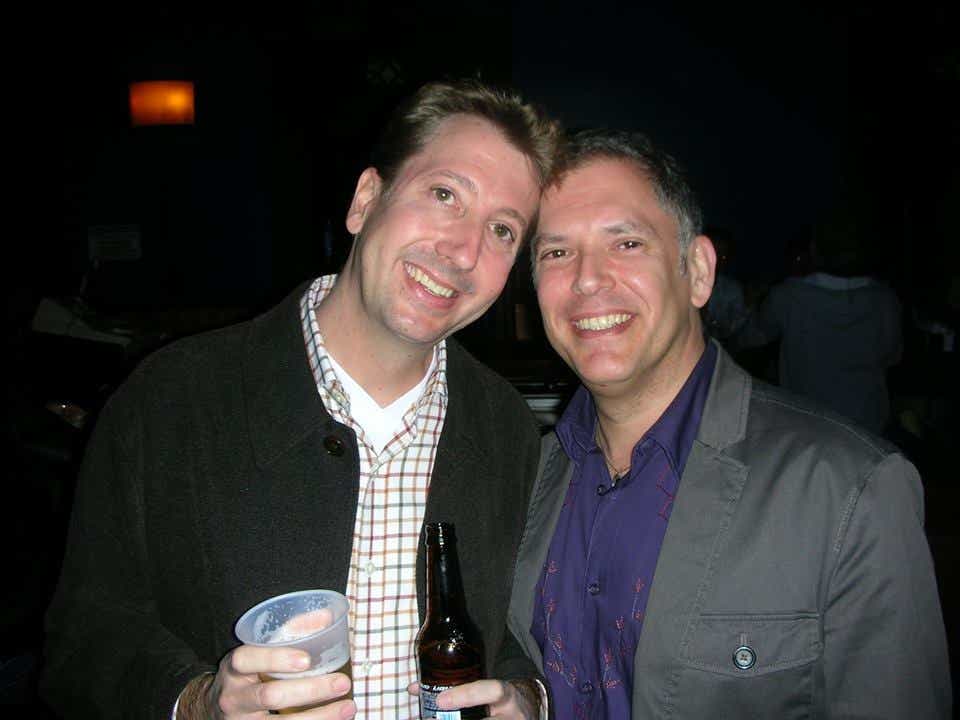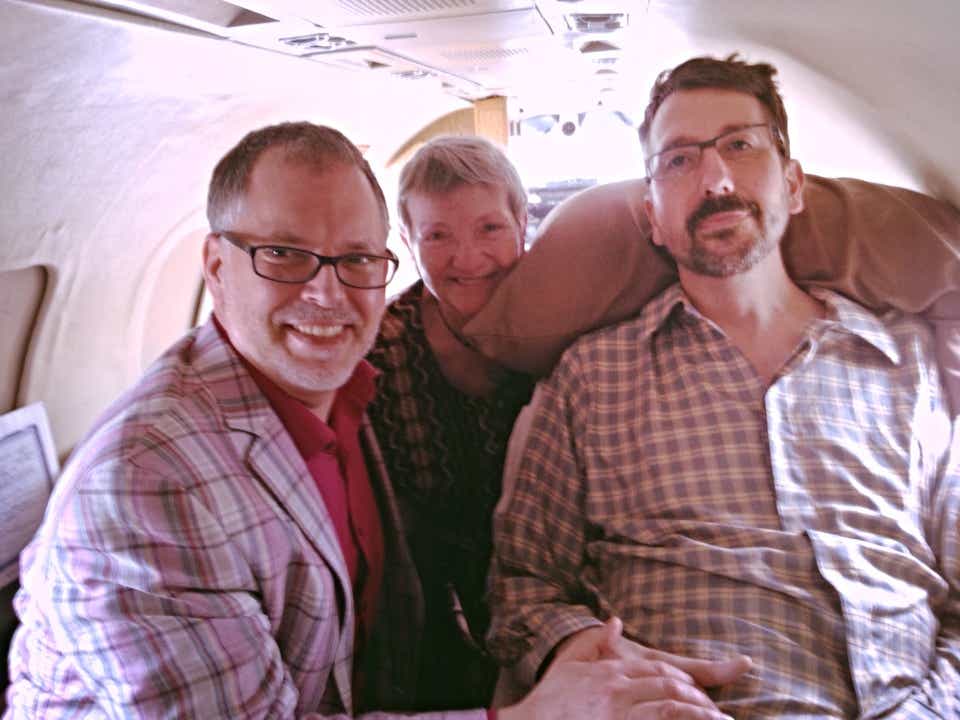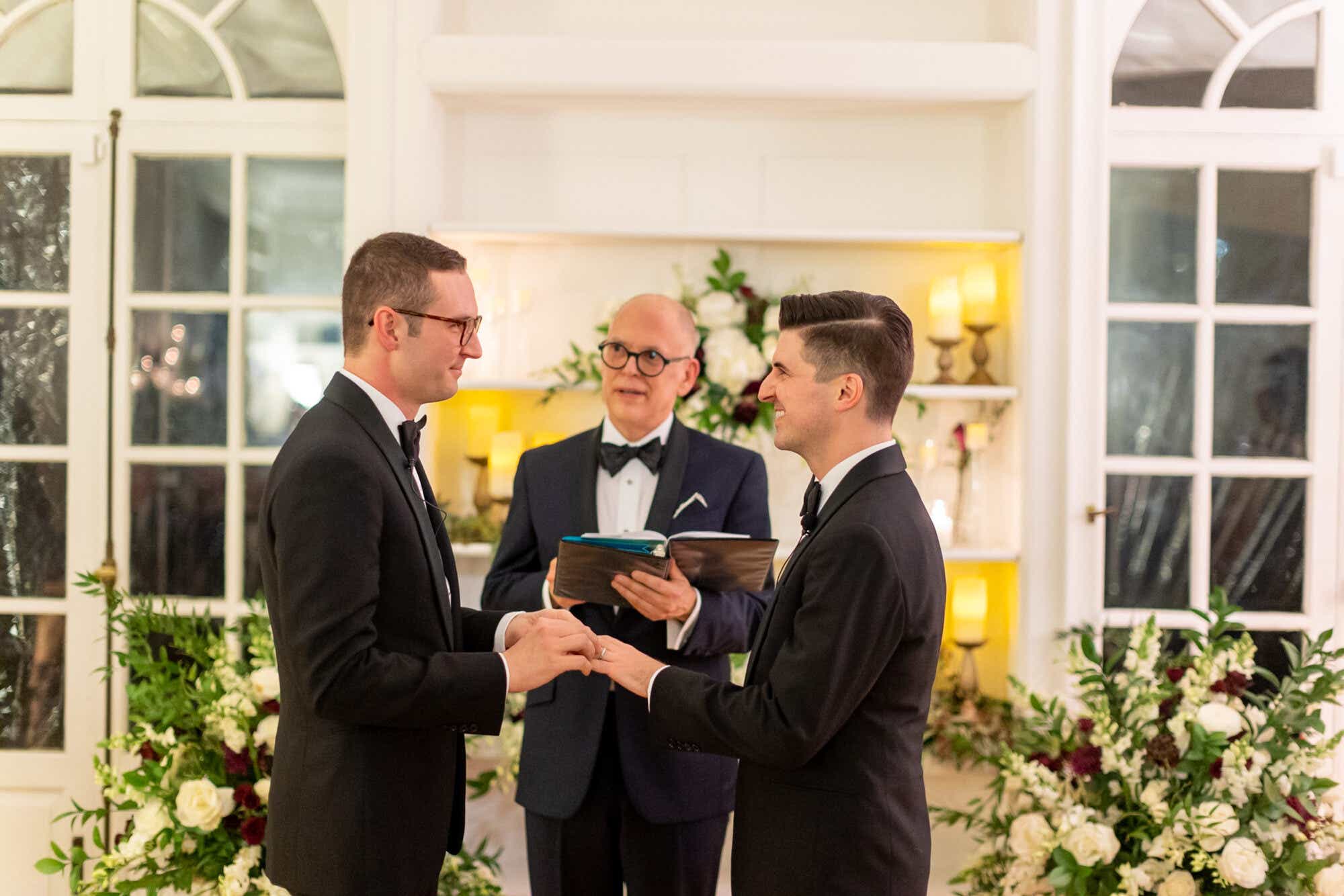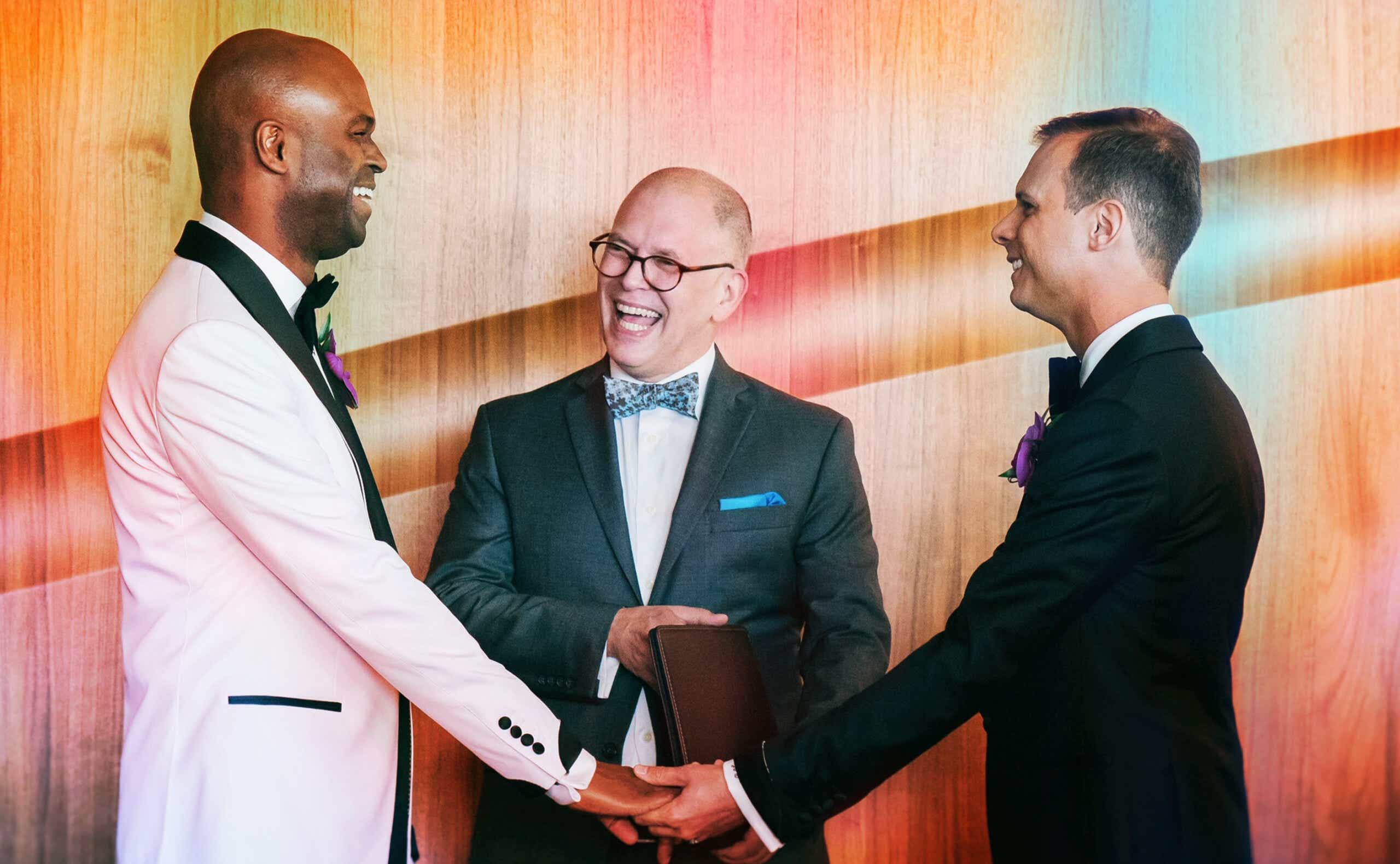June 26 marks a key milestone for the LGBTQ community in more ways than one. It’s the anniversary of three landmark U.S. Supreme Court decisions, starting with Lawrence v. Texas in 2003, which struck down sodomy laws that restricted same-sex intimacy behind closed doors. Then there was United States v. Windsor in 2013, which ruled that the Defense of Marriage Act, a federal law defining marriage as a union between one man and one woman, was unconstitutional. Both of these cases helped pave the way for Jim Obergefell, whose own case, Obergefell v. Hodges, legalized gay marriage nationally in 2015.
Obergefell’s victory was by no means a certainty, but he says both of those previous decisions gave him hope at a time when a win wasn’t a guarantee. “Given the fact that those two other cases came out on June 26, we felt pretty optimistic that more good news was on the way — and that’s exactly what happened.”
Sadly, his husband, John Arthur, who died in 2013 of ALS, didn’t live to see the decision, but Obergefell says the love that they shared continues to live on. “The first thought I had was, ‘John, I wish you were here. I wish you could experience this. I wish you could know that our marriage can never be erased.'”
Since that decision, Obergefell has remained as busy as ever. He ran for office in his home state of Ohio last year, and even though he lost against Republican incumbent D.J. Swearingen, he has no regrets. “It was important for me, to step up and to do that and to give people in Ohio hope,” he tells Katie Couric Media. He also has the wine label Equality Vines, and he’s currently developing a new eight-part documentary series, JustMarried, which will focus on LGBTQ+ couples. As if that wasn’t enough, he’s continuing his activism as a board member across various companies, such as WebQ, and even officiating weddings (he has done 23 so far).
We sat down with Obergefell to look back at the case and how his marriage with his late husband inspired his ongoing fight for queer couples everywhere.
Katie Couric Media: Your name will be forever linked to marriage equality. What was it like to become the face of the movement?
Jim Obergefell: I honestly still have to pinch myself at times when I hear people talking about marriage equality or when they reference “Obergefell,” to remind myself that they’re actually talking about me. It still doesn’t feel possible that I’ve become part of this momentous step forward for equality in the United States. I never wanted to be a name or a face that people knew, but I’m okay with it because I’m known for being part of something really important, something really meaningful. And the fact that people still stop me and recognize me and thank me, share photos with me, tell me stories, those moments are so incredible. It just continually reminds me how important marriage is and what it means to people across our country that they can marry the person that they love. And there’s nothing for me better than hearing from young people telling me that marriage equality gave them hope for the future, a hope that they did not previously feel.
As some may or may not know, you were among several plaintiffs in the case, Obergefell v. Hodges. What was it like to have your name chosen?
Hodges is a consolidated case, and there are more than 30 other plaintiffs from four states in this case. And honestly, I felt guilty because suddenly my name, my face, and my story became the focus. Others in the case had equally compelling stories.
But the one thing I learned about the Supreme Court is there’s no grand scheme on how they name a case. It really comes down to timing. Our attorney, Al Gerhardstein, filed our appeal with the Supreme Court just 10 minutes before the attorneys for the Tennessee case did. That’s the only reason it became known as Obergefell v. Hodges — because the Supreme Court will name the consolidated case after the case with the lowest case number, which means the first case to appeal to that court. Nothing more than that. It was just timing.
Do you still stay in touch with any of your fellow plaintiffs on the case?
The great thing about being one of more than 30 plaintiffs in Obergefell v. Hodges is that we did become a family. For me personally, going through this case, especially after John died, gave me a source of strength. The case gave me people to lean on in addition to my family and friends. But we went through this together, we had that support. We could talk to people who knew exactly what we were going through and we could relate. So I feel really fortunate that I was not the only one in this case. I can’t imagine how lonely and how overwhelming that would be. I had the joy of having these many other plaintiffs that I could turn to and talk to about what we were experiencing.
You mentioned timing was really key at the time. Was there any sort of pushback against bringing the case to the Supreme Court?
One of the things that became abundantly clear after we filed our case and won our first hearing was that within the broader LGBTQ+ community, there are a lot of goals and strategies out there for moving us forward when it comes to our equality in the United States. And after we won our first hearing in federal district court, national organizations were reaching out to Al Gerhardstein, our attorney, and saying, “Al, drop this case — it doesn’t fit our strategy to win marriage.” And to Al’s credit, every single time he heard that, his response was, “No, I have clients who are being harmed and my duty as their attorney is to do what’s in their best interest. We will not drop this case.”
What was it like being in the courtroom hearing the decision being read?
Jim Obergefell: I still remember when the court came to order, and Justice Kennedy started to read his decision. The first few sentences, I thought we won, but then he kept reading. I certainly have a much more personal, much more front-seat experience in our justice system than a lot of people do now, but I’m still not an attorney. Legal writing isn’t always clear to those of us who aren’t attorneys. I found myself wondering, “Well, did we really win?” So I started off happy and excited, and then I started to wonder, “Did I misunderstand?”
But as Justice Kennedy continued reading his decision, the summary, I realized, “Okay, I was right. We did win.” And I burst into tears along with people throughout that courtroom. And in fact, Al told me later, he has never seen so many attorneys crying in a courtroom. It was a wonderful thing. And not surprisingly, the first thought I had was, “John, I wish you were here. I wish you could experience this. I wish you could know that our marriage can never be erased.” That was closely followed by the realization that for the first time in my life as an out gay man, I felt like an equal American.

I can’t imagine all of the emotions during that moment and just thinking of all of your memories with your late husband. How did y’all first meet?
The first time I met John, I was still closeted. I was teaching high school German and I hadn’t come out. I knew I was gay, but I hadn’t really admitted it to myself and I certainly hadn’t told anyone else. I happened to go out with a friend to a bar near the university where we had both graduated, University of Cincinnati. We walked into this bar and my friend Kevin said, “Well, there’s my friend John.” John was at the bar drinking a gin and tonic, and we met and he scared the daylights out of me. He was so comfortable in his skin. And, as an out gay man, I thought for certain he was going to call me out and just say, “Come on, Jim. We all know you’re gay.” But he didn’t.
The second time we met, I had by that point gone to graduate school. During graduate school, I came out, and I was back in Cincinnati visiting and went out with that same friend. We went back to that same bar, and guess who was at the bar drinking a gin and tonic yet again, but the tall blonde named John. During that conversation, John said, “Well, Jim, you’d never go out with someone like me.” I have no idea where I found the wit or the courage to respond the way I did. But I said, “How would you know if you haven’t asked?” And the jerk did it.
The third time was the charm. I was back in Cincinnati for the holidays that year. By this point, my friend Kevin had become one of John’s housemates, and Kevin invited me to John’s house for a New Year’s Eve party. I went to that house. And I like to say I never left. John liked to say for us, “It wasn’t love at first sight, it was love at third sight.”

I love that story. It’s hard to believe that it has been eight years since the decision on same-sex marriage. Do you see that as part of an ongoing fight for equality?
Even back on June 26, 2015, with the decision with marriage equality becoming the law of the land, it was clear right from the start that we still weren’t really going to enjoy marriage equality. All they have to do is mention Kim Davis, the clerk of court in Kentucky who refused to issue marriage licenses to same-sex couples. We’ve had states that have continually tried to undermine our right to get married and what those marriages mean. And in fact, the state of Tennessee tried to actually do away with gay marriage completely because they did not want to allow or recognize same-sex marriages. They wanted to make all marriages a contract. So we have continued to have these fights for our marriages, for our relationships, and for our families to be treated the same way as any other marriage, any other family. And that resulted in the passage of the Respect for Marriage Act last year.
I’m glad the Respect for Marriage Act exists. I’m not a huge fan of it, mainly because it would, once again, allow states — like the state of Ohio, where I live — to refuse to issue marriage licenses to same-sex couples. So we are fighting to make sure that our families receive the same rights, respect, and protections as any other family. As I mentioned in my remarks in front of the Supreme Court after the Obergefell v. Hodges ruling, “I look forward to the day that it’s no longer gay marriage and it’s just marriage.”

I wanted to get your thoughts about the current state of gay rights. What do you make of the record number of anti-LGBTQ bills?
Jim Obergefell: I look across the country and I see all of these anti-LGBTQ+ bills that are being proposed or passed, and honestly, they disgust and depress me. It disheartens me that our nation, whenever we have a step forward in civil rights, there’s a backlash. Right now the community is being targeted, demeaned, diminished, and in some places being legislated out of existence. How does that help our kids? How does that help anyone in this nation? Think about the kid who’s starting to accept the fact that they are not part of this strict gender binary. How do they feel when they see their governor sign a bill that targets them that says they don’t matter, that they don’t exist? That’s incredibly harmful and that will do nothing but continue to contribute to the high suicide rate for youth.
This is all just a culture of war, and I look forward to the day that these things stop happening. I’m not sure when that will be. What gives me hope is knowing that there are a lot of people and a lot of organizations out there who are fighting back against these harmful things. I also know kids today are growing up in a world that’s much better than the world I grew up in.
Even with all of the harmful things happening this year, it’s still a better world because they do have a future they can look forward to when it comes to marrying the person they love and having a family. Things are better. But I look forward to the day that we can all just be human beings and we treat each other with the same respect.
This interview has been edited and condensed for length and clarity.









